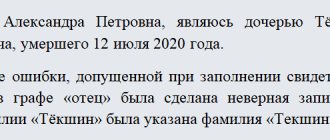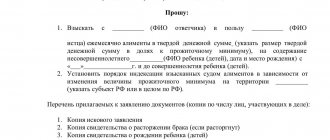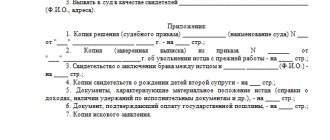The application form and the package of attached documents (evidence) depend on various factors. For example, if there is only one heir, then he can submit an application according to a simplified scheme - in the order of special proceedings (Article 262 of the Code of Civil Procedure of the Russian Federation). This includes cases of restoring deadlines and establishing legal facts.
Step-by-step instructions (special production):
- Preparatory stage . The applicant needs to prepare documents and contact a notary. Action is required to establish an interest in the property. In addition, you need to receive a reasoned refusal (for example, if the applicant missed the deadlines established by law).
- Trial . The applicant prepares, checks and submits an application to the court. Along with it, you need to submit the necessary papers, including a receipt for payment of the state duty. If no questions arise, the court sets a date for consideration of the appeal. Special proceedings do not require the presence of the parties, but the court may call the applicant and heirs to clarify certain nuances.
- Registration of inheritance . The resulting court decision forms the basis for further actions. If the decision is positive, then the heir will need to visit the notary again, submit a package of documents to him and write an application for acceptance of the inheritance. After receiving a certificate of inheritance, the applicant needs to visit Rosreestr, the Federal Tax Service or the State Traffic Safety Inspectorate and register ownership.
- Filing an appeal . If the court decision is not in favor of the applicant, an appeal can be filed within 10 days. The law allows the preparation of a complaint within a period of 1 month. Submission of documents occurs through the court of first instance - and in fact the case is considered by a higher court. Based on the results of the consideration, the panel of judges will make a decision - to reject/satisfy the complaint. In the first case, the heir loses the right to the property. If the appellate court overturns the court decision and recognizes the claims, the heir will be able to contact a notary and draw up documents.
Expert opinion
Stanislav Evseev
Lawyer. Experience 12 years. Specialization: civil, family, inheritance law.
If other applicants have entered into rights and a dispute arises, the hearing of the case will take place within the framework of the claim proceedings. The defendants are the persons who received the certificates. The algorithm of actions of the heir is the same as in the first case. The only difference is that here it is not an application, but a statement of claim. The amount of the state duty is calculated based on the cost of the claim. If the court decision is in favor of the plaintiff, then there is no need to contact a notary. The judicial act serves as the basis for subsequent registration of property rights.
Documentation
When submitting an application, you must take care of evidence. Each circumstance stated in the claim must be confirmed in writing - oral arguments are not accepted, with the exception of the testimony of witnesses.
Failure to provide documentation will result in claims being denied. The court cannot base its decision only on the oral testimony of the participants in the trial.
Only those facts that were established by a court decision in another case, if its participants were the same persons, are not subject to proof (Article 61 of the Code of Civil Procedure of the Russian Federation).
List of required evidence documents:
- copy of the applicant's passport + original for confirmation;
- original will (if available);
- evidence of the death of the testator - a death certificate from the registry office;
- papers confirming the relationship with the deceased person (if any);
- documents for the opened inheritance - registration and legal;
- written refusal of a notary and/or registration authority (for example, traffic police);
- grounds for missing the 6-month deadline for entering into inheritance;
- report on the value of property - an act of an appraisal company and/or an extract from the Unified State Register of Real Estate with cadastral data;
- a document confirming payment of tax - a receipt.
A copy of the power of attorney will also be required if the documents are being submitted by a representative of the plaintiff.
Time limits for going to court
There are several deadlines for filing a lawsuit:
- An application for restoration of deadlines is submitted within 6 months from the moment the reason for absence ceases (for example, returning home from a man-made disaster zone).
- A statement of claim for property disputes is filed within the limitation period - 3 years (clause 1 of Article 196 of the Civil Code of the Russian Federation).
- The law does not define any time limits regarding the property actually accepted - the heir can go to court at any time, based on life circumstances.
Claims are subject to consideration within 2 months from the date of the citizen’s application (Clause 1, Article 154 of the Code of Civil Procedure of the Russian Federation). The first hearings are scheduled no earlier than a month after the claim is registered. The total time can take up to 3-6 months, and in particularly difficult cases - up to a year. Of course, the inheritance deadlines will be missed.
But in this situation, the court extends the period for entering into inheritance and restores it at the request of the beneficiary. Thus, even if the hearings drag on for six months or a year, the heir will not lose his chance of inheritance.
State duty
The key question when preparing for trial is how much does it cost to draft and file a claim?
To submit an application to establish a legal fact, you need to pay a state fee of 300 rubles (Article 333.19 of the Tax Code of the Russian Federation). After the judicial act is issued, the applicant will need to contact the notary again.
If the claim is of a property nature (recognition of ownership of the inheritance), then you will have to evaluate the property and pay a fee, as for a property claim (from 400 to 60,000 rubles).
The costs of registering an inheritance will depend on the degree of relationship and the value of the inherited property: close relatives pay 0.3% of the price of the inheritance, and distant and strangers pay 0.6% of the property.
What is the amount of state duty when filing a claim? The amount of the fee is calculated based on the cost of the claim - the higher it is, the more you will need to pay. Moreover, the rate consists of two components - the base tariff and a percentage of the minimum threshold.
Example:
The heir filed an application for actual acceptance of assets and recognition of ownership of the inheritance. The plaintiff claimed the dacha of his deceased brother. The amount of the claim was 700,000 rubles. It is based on paragraphs. 1 clause 1 art. 333.19 Tax Code of the Russian Federation. Tax calculation – 10,200 (5200 + 5000) rub. The first amount is the base rate. The second figure is 1% of the difference between the minimum threshold and the value of the inheritance (700,000-200,000).
If the court decision is in favor of the plaintiff, the heir will be able to immediately register ownership rights. As we found out above, there is no need to visit the notary again. However, for registering property rights (Rosreestr, MFC, State Traffic Safety Inspectorate, Federal Tax Service) you will need to pay an additional state fee. Its size depends on the specific legally significant action. For example, to register ownership of an apartment, an individual needs to pay 2,000 rubles (clause 22, clause 1, article 333.33 of the Tax Code of the Russian Federation), registration of a summer cottage will cost 350 rubles, etc.
If the plaintiff is entitled to benefits, then supporting documents must be submitted at the application stage. A similar rule applies when performing notarial acts.
The procedure for registering an inheritance through the court
When an inheritance is formalized through court
Circumstances under which entry into inheritance is possible only through court:
- a will made in emergency circumstances;
- missing the deadline established by law for accepting an inheritance;
- the need to establish a relationship;
- proof of actual acceptance of the inheritance;
- lack of a registered right to the testator’s property;
- dispute between heirs regarding the division of inheritance;
- invalidation of a will;
- recognition as unworthy of an heir.
How to register an inheritance by court decision
Procedure for registering an inheritance through the court:
- Prepare documents for going to court:
- documents confirming relationship;
- if the deadline for accepting the inheritance has been missed, document the validity of the reasons;
- document the actual acceptance of the inheritance;
- death certificate;
- title documents for property;
- refusal of the notary (if such a fact occurred);
- receipt of payment of state duty.
- Preparing an application to the court.
- Submitting an application and documents to the court.
- Adjudication.
- Obtaining a court order.
- Registration of ownership of property.
The parties can appeal the court decision within two weeks
After receiving a court decision, you must contact a notary with an application to accept the property. After the expiration of the period allotted for inheritance, obtain a notarial certificate.
In order not to contact the notary again, the heir can recognize the ownership of the inheritance through the court.
The application can be submitted using a simplified procedure. The list of cases considered by the court in special proceedings is presented in Art. 262 of the Code of Civil Procedure of the Russian Federation.. These are cases in which the property interests of other persons are not affected - the establishment of facts of legal significance; confirmation of relationship; restoration of lost judicial proceedings.
If the main participants in the dispute are both the plaintiff and the defendant, the consideration of the case can take place through a lawsuit. A statement of claim is filed with the court.
Grounds for recognition as heir
The basis for going to court is the refusal of the notary in charge of the inheritance case to issue a certificate of inheritance rights.
This document gives the heir the right to protect his interests in court. The result of the trial is a court decision. In essence, it replaces a certificate of inheritance rights. The citizen must wait for the document to enter into legal force. After which, on its basis, it is possible to carry out state registration of ownership of inherited objects.
Rules and features of inheriting a donated apartment
The order of succession according to law in 2021
How to draw up a claim correctly
When drawing up a statement of claim, you must be guided by the requirements of Art. 131 Code of Civil Procedure of the Russian Federation. The appeal is submitted in writing, the number of copies corresponds to the number of participants in the process.
Basic provisions of the contents of the statement of claim
- name of the court;
- plaintiff's details:
- Full name;
- location;
- contacts (phone, email).
- information about the defendant:
- Full name;
- location;
- Date and place of birth.
- cost of claim;
- information about the testator, property;
- a description of the situation that led to the dispute;
- evidence supporting the circumstances;
- information about pre-trial settlement;
- legal acts, references to legislation;
- final requirement;
- list of documents;
- signature of the plaintiff or representative.
The circumstances specified in the claim are supported by documented evidence.
List of documents attached to the claim
- passport (copy and original);
- will;
- death certificate;
- confirmation of family ties;
- property documents;
- assessment act;
- receipt of payment of state duty;
- evidence for the stated requirement.
Each situation has its own package of documents and evidence. The documents are numbered and filed with the statement of claim.
Which court hears inheritance claims?
Often these are courts of general jurisdiction - district or magistrates. In determining jurisdiction, one should rely on the legislative norms that form the basis of the claim document. Jurisdiction reflects the level of authority and jurisdiction.
What is territorial jurisdiction
Here we are talking specifically about attachment to the territorial district. The claim must be filed at the place of residence of the defendant. The justification for substituting to appear at your place of residence is, for example, if it is necessary to care for an infant. Special production always uses its own registration.
Time limits for going to court
According to Article 1154 of the Civil Code of the Russian Federation, the period for accepting an inheritance is 6 months from the date of opening of the inheritance. The deadlines for applying to court are as follows:
- to restore the lost period no more than 6 months from the moment the successor learned about the opening of the inheritance
- to challenge a will no more than a year from the moment when the plaintiff should have learned about the contestability of the will
- The statute of limitations is three years from the date the plaintiff learned of the offense
- the total period is not more than 10 years from the date the dispute actually arose
Unaccounted for heir
The possibility of the appearance of illegitimate children of the testator during the division of the inheritance is never excluded.
However, an unfounded statement that the acquired relative is the testator’s son or daughter will not be enough. The notary will require a birth certificate that lists the testator as the parent.
If there is no such entry in the birth certificate, the notary will refuse to recognize the applicant as an heir and invite him to file an administrative claim in court to establish the fact of paternity. You can read the material on this topic and download a sample statement of claim on our website.
If the court satisfies the claim, the notary will include the applicant in the circle of heirs.
State duty when entering into an inheritance through the court
The state fee for filing a claim is 300 rubles per claim. If several claims are made, 300 rubles are paid for each claim.
If the requirement is for the division of inherited property, the amount of the state duty will depend on the price of the claim. State duty calculation table:
The state duty when registering an inheritance depends on the degree of relationship and the value of the property. Close relatives – 0.3% of the value of the inheritance, all others 0.6%
Arbitrage practice
Resolution of the Plenum of the Supreme Court of the Russian Federation of 2012 No. 9 establishes the following nuances in cases of recognition of property rights by inheritance:
- This requirement affects jurisdiction. If it is necessary to establish a legal fact, the claim is filed at the applicant’s place of residence. But if there is a requirement for recognition of ownership rights - at the location of the property.
- The application can only be submitted 6 months after the death of the owner. Before the specified period, the claim cannot be accepted even if there are compelling reasons (lack of necessary documents for the property).
- If a claim is filed for the division of inherited property and recognition of ownership rights, or in relation to real estate, then it is considered property. Accordingly, the amount of state duty increases significantly.
Peculiarities of drawing up a claim under various circumstances of inheritance
Restoring the missed deadline for accepting an inheritance
To submit this application, there must be valid reasons for missing the deadline and strong documented evidence (Article 1155 of the Civil Code of the Russian Federation). The statute of limitations is three years from the moment when the applicant for the inheritance learned or could have learned about the violation of his property rights.
| Claim for restoration of the period for accepting an inheritance |
Recognition of the heir as unworthy
In a claim to restore the term, you can make a demand to recognize the other heir as unworthy due to concealment of information. The defendant will be an unworthy legal successor (Article 1117 of the Civil Code of the Russian Federation).
| Claim for recognition as an unworthy heir |
Division of inherited property
When considering a statement of claim, the financial situation of the parties, testimony of witnesses, participation and financial investments in the disputed property and the requirements of the legislation of Art. 1164-1170 Civil Code of the Russian Federation.
| Statement of claim for division of inherited property |
Contesting a will
To challenge a will, the statement of claim is supported by documents that are evidence for the legal revocation of the will (Civil Code of the Russian Federation, Article 1131).
Grounds for revocation of a will:
- violation of the form and content of the will;
- the interests of other participants are infringed;
- drawing up a document by an incapacitated person;
- registration under duress;
- fraudulent activities.
| Statement of claim for invalidation of a will |
How much to wait?
After considering the claim (if no serious errors are found), the judge sets a date for a preliminary hearing . Then there is a main hearing, after which a judgment is made. These actions cannot take more than two months. The judge can also take five days to clearly write and formalize the decision.
The period for entry into force of the decision is no more than ten days. Then you can turn to the bailiff who will execute it, for which he is given a maximum of three months.
Questions about inheritance: answers from a lawyer
Is it possible to challenge a will?
A will may be declared invalid by a court upon the claim of a citizen whose rights or legitimate interests are violated by this will. To do this, it is necessary to confirm the circumstances that caused the violation of the plaintiff’s rights.
What to do if the deadline for accepting an inheritance has been missed?
An inheritance can be accepted within six months from the date of opening of the inheritance (Article 1154 of the Civil Code of the Russian Federation). At the request of an heir who has missed the deadline, the court may restore this deadline and recognize the heir as having accepted the inheritance if the heir did not know about the opening of the inheritance or missed this deadline for other valid reasons (Article 1155 of the Civil Code of the Russian Federation).
What documents are needed to inherit an apartment through court?
For real estate (apartment), you must provide the following package of documents: an extract from the Unified State Register of Real Estate, the basis for the emergence of the right (purchase and sale agreement, equity participation agreement..), technical passport, apartment appraisal report, certificate of residents living in the apartment.
Instructions on how to obtain permission to use property
In order to obtain permission to use the property, you must write a statement of claim to the court. And to do this, you need to collect convincing arguments, pay a fee and correctly draw up an application.
Where to contact?
There are two main courts that you can contact when filing an application:
- Court at the place of residence of the deceased (Articles 24, 28 of the Code of Civil Procedure of the Russian Federation). You can write a statement here if the case under consideration concerns items that are not tied to a specific address (for example, you need to establish the presence of family ties, or confirm the fact of entering into the inheritance of other people).
- The court at the location of the estate (Article 29 of the Code of Civil Procedure of the Russian Federation). You should contact this authority if you are talking about real estate. These may be disputes about the division of property, its use, recognition of rights to it.
Important! If, when applying, it is necessary to divide not one, but several objects that are located in different places or cities, then the law allows this to be done in any of the courts located at the location of the objects of inheritance.
Required documents
To successfully consider the case, the package of documents must include:
- A document that confirms the identity of the person applying (passport).
- A document certifying the death of the testator.
- A claim in a number of copies equal to the number of participants in the lawsuit.
- Will, if one exists.
- Receipt for payment of duties.
- Documents that provide evidence of family ties and rights to property.
- Certificate of the last place of registration of the deceased.
- Any other documents that may be useful.
What evidence should I provide?
The court considers the following documents and items as evidence:
- Any papers that can confirm the presence of a family or blood connection with the deceased (certificates, passports, certificates).
- Certificates or agreements, the content of which implies the existence of a person’s rights to a share in the inheritance.
- Documents that can serve as factual evidence (certificates from hospitals, international passports, letters).
- If other courts have been involved in the case before, then decisions on them must be attached (in case of deprivation of parental rights or the presence of unworthy heirs has been established).
- Any other papers and materials that serve as evidence (personal correspondence, telephone conversations, videos, audio recordings, witness statements).
Important! It is mandatory to provide reliable, legal and truthful evidence. Otherwise, it will be difficult to resolve the issue positively.
How to file a claim?
The reason for the application must be clearly stated on paper (in the form of a request). If there are several reasons, they must be listed in one document.
In addition, you should write:
- The name of the court to which the appeal is made and its physical address.
- Document's name.
- Date of preparation of the paper and personal signature.
- Full information about the plaintiff and defendant (if any).
- Information about the testator.
- A receipt for advance payment of the fee by the plaintiff.
- The value of all property that needs to be divided (it is determined immediately after the death of a person with the help of an independent expert or a government service).
- Evidence for application (presence of family ties).
- Information about other heirs and property.
- Legislative acts that are used when drawing up the paper.
- A list of all documents that are submitted in one package with the claim.
Important! This paper must be written clearly, legibly, concisely and to the point. The presence of confusing explanations, inaccuracies, and unnecessary details can make it difficult to resolve the case positively.
Claim for recognition as heir by law 2021
The information must be presented in the claim in a clear and concise form that is easy to understand. Each of the given circumstances disclosed in the application must be supported by evidence and relevant documents. An officially submitted claim must be fully substantiated.
Dear readers! Our articles talk about typical ways to resolve legal issues, but each case is unique.
If you want to find out how to solve your specific problem, please contact the online consultant form on the right. It's fast and free! Or call us at:
Statement of claim for recognition of the right to inheritance: sample
on recognition as heir
On March 11, 2021, Bortsov Pavel Ignatievich (full name of the deceased) died. After his death, an inheritance was opened, consisting of a one-room apartment at the address: Kostroma, st. Nekrasova, 17 kv.38 (indicate the composition of the inherited property).
I am the heir of the first line of inheritance (queue of inheritance) after the death of Pavel Ignatievich Bortsov (full name of the deceased) on the basis of the law (indicate the grounds for inheritance, by law or will). There are no heirs of other queues.
There were errors in the documents confirming my right to inheritance; an error was made in the father’s patronymic in the birth certificate (indicate which errors prevent the notary from registering the inheritance out of court).
How to file a claim for recognition of the fact of inheritance, read here.
In accordance with Article 1155 of the Civil Code of the Russian Federation, if there are no heirs of the first, second and third orders, the right to inherit by law is given to the relatives of the testator of the third, fourth and fifth degrees of kinship, who are not related to the heirs of the previous orders.
Relatives of the third degree of kinship - the great-grandfathers and great-grandmothers of the testator - are called upon to inherit as fourth-degree heirs.
as fifth-degree heirs, relatives of the fourth degree - children of the testator’s nephews and nieces (cousins and granddaughters) and siblings of his grandparents (great-grandparents)
as heirs of the sixth degree, relatives of the fifth degree of kinship are the children of the testator’s cousins and granddaughters (great-great-grandsons and great-granddaughters), the children of his cousins (great-nephews and nieces) and the children of his great-uncles and grandmothers (great-uncles and aunts).
If there are no heirs of previous orders, the stepsons, stepdaughters, stepfather and stepmother of the testator are called upon by law to inherit as heirs of the seventh order.
- Recognize me as an heir by law after the death of Pavel Ignatievich Bortsov (full name of the testator), who died on March 11, 2021.
I request the following to be summoned to court as witnesses: Alla Stepanovna Bortsova, Kostroma, st. Ozernaya, 17, Bortsova Inna Pavlovna, Kostroma, st. Kirova, 18 kv. 19 (full name, full address).
List of documents attached to the application (copies according to the number of persons participating in the case):
- Copy of the statement of claim
Application date: October 22, 2021
Signature of the plaintiff _______A.P. Wrestlers
Statement of claim for recognition of the right to inheritance: form
In ____________________________ (name of the court) Plaintiff: ________________________ (full name, address) Defendant: _____________________ (full name, address) Cost of claim: _____________________ (full amount of claims)
on recognition as heir
“___”_________ ____ died _________ (full name of the deceased). After his death, an inheritance was opened consisting of _________ (indicate the composition of the inherited property).
I am the heir of ___ (queue of succession) after the death of _________ (full name of the deceased) on the basis of _________ (indicate the grounds for inheritance, by law or will). There are no heirs of other queues.
There were errors in the documents confirming my right to inheritance _________ (indicate which errors prevent the notary from registering the inheritance out of court).
The fact that I am _________ (degree of relationship) with the deceased _________ (full name of the deceased) is confirmed by _________ (list evidence confirming the existence of rights to inheritance), and in addition can be confirmed by the testimony of witnesses _________ (full name and address).
In accordance with Article 1155 of the Civil Code of the Russian Federation, if there are no heirs of the first, second and third orders, the right to inherit by law is given to the relatives of the testator of the third, fourth and fifth degrees of kinship, who are not related to the heirs of the previous orders.
Relatives of the third degree of kinship - the great-grandfathers and great-grandmothers of the testator - are called upon to inherit as fourth-degree heirs.
as fifth-degree heirs, relatives of the fourth degree - children of the testator’s nephews and nieces (cousins and granddaughters) and siblings of his grandparents (great-grandparents)
as heirs of the sixth degree, relatives of the fifth degree of kinship are the children of the testator’s cousins and granddaughters (great-great-grandsons and great-granddaughters), the children of his cousins (great-nephews and nieces) and the children of his great-uncles and grandmothers (great-uncles and aunts).
If there are no heirs of previous orders, the stepsons, stepdaughters, stepfather and stepmother of the testator are called upon by law to inherit as heirs of the seventh order.
- Recognize me as an heir by law after the death of ________ (full name of the testator), who died ___ _________ ____
I request the following to be summoned to court as witnesses: _________ (full name, full address).
List of documents attached to the application (copies according to the number of persons participating in the case):
- Copy of the statement of claim
- Document confirming payment of state duty
- Death certificate of the testator
- Documents confirming the right of inheritance
- Documents confirming the existence of inherited property
Application submission date ___ _________ ____
Plaintiff's signature _______
Statement of claim for recognition of the right to inheritance: actual acceptance
Entering into an inheritance through the court or how to file a claim for recognition of the right to inheritance
The standard inheritance procedure consists of a simple, strictly regulated procedure, when the successor, within the prescribed period, comes to the notary with a full package of necessary documents and submits an application for acceptance of the property. But in reality this does not always happen.
When at least one link in the chain of obligatory actions is missing, the heir is excluded from the circle of legal successors, giving way to secondary contenders. But even here, relaxations are possible, allowing a citizen whose rights have been infringed to enter into an inheritance through the court. But first, find out under what circumstances this makes sense and how to file a claim to restore the legitimacy of your property claims.
Grounds for entering into inheritance through court
A potential plaintiff should be aware of his options and make full use of them when asserting inheritance rights.
So, the need to enter into an inheritance through the court may arise under the following circumstances:
- The deadline for accepting the property of the deceased has been missed.
- The entry into inheritance was carried out virtually, without notarization.
- The heir does not have documents confirming the relationship (in case of inheritance by law).
- The assignee was found unworthy.
- The heirs cannot agree on the distribution of property.
- There are reasons to believe that the testator is dead, but there is no direct evidence of this.
- To enter into an inheritance, it is necessary to prove dependence at the expense of the now deceased.
Each of the listed situations can be challenged or established in court, but only if there are compelling reasons and irrefutable evidence for this.
Restoring the deadline
The period for accepting property rights can be restored in the event of ignorance of the death of the testator or in the absence of the opportunity to declare one’s intention at the place of opening of the inheritance.
It is important to file a claim to enter into inheritance no later than six months after the obstacles to this have disappeared. And also - provide reliable evidence that overcoming these obstacles was beyond the plaintiff’s control for a long period within six months from the date of the testator’s death.
A court decision in favor of the plaintiff becomes the basis for reviewing the already completed distribution of property between other claimants and canceling the certificates of inheritance issued to them.
Establishing the fact of acceptance of property
There are no specific time limits for establishing the fact of inheritance. In fact, it is not necessary to do this if the actual heir does not plan to sell the property or pass it on by inheritance. However, property not registered with a notary may be mistakenly accepted by other successors, which will entail additional disputes and litigation.
When the actual successor wishes to receive a certificate of title to the inherited property, he will need to draw up a statement establishing the fact of acceptance of the inheritance. And also provide evidence of typical actions (operation of property, care for it, material maintenance and repayment of debts of the deceased owner).
Establishing kinship
When the successor does not have documents confirming the family relationship with the deceased, and the inheritance is carried out in the order of legal priority, it is possible to establish the relationship through the court.
To do this, the applicant needs to collect testimony from witnesses, extracts from archives and provide a documented refusal from the civil registry office to issue a duplicate of the required document (birth, death, adoption or marriage certificate).
In the absence of substantiated evidence, the determining circumstance for the court may be the result of a genetic examination.
Unworthy heir
Article 1117 of the Civil Code of the Russian Federation establishes the concept of an unworthy heir. According to its instructions, this category may include persons who:
Cost of claim and state duty
The claim for recognition of the right to inheritance is of a property nature, so it is important to accurately determine the amount of the claim price and the amount of the state duty.
The claim price is the value of the disputed property.
You can find out in the following ways:
- look at the value of the property in the cadastral or inventory file. But the court must provide an extract received from the BTI;
- conduct a property assessment. To do this, you need to contact an organization or an individual involved in real estate assessment, but who has a license.
Jurisdiction
Civil cases on recognition of the right to inheritance are considered in the courts at the place where the inheritance was opened. An inheritance case is opened at the last place of residence of the testator or at the location of most of the property of the deceased. Similar cases are heard in both city and district courts.
Attention! Our qualified lawyers will assist you free of charge and around the clock on any issues. Find out more here.






